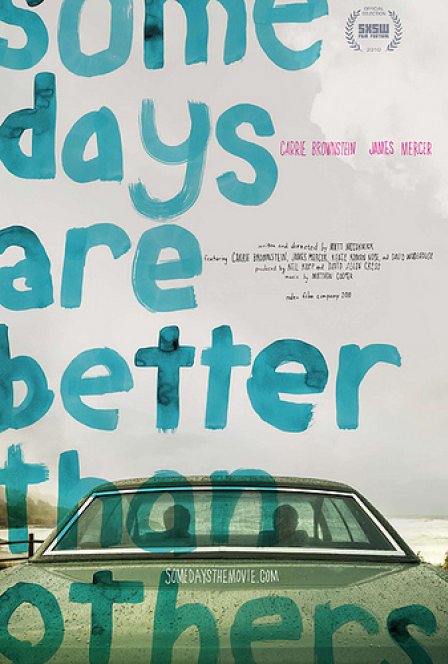Perhaps if this film were released closer to the time period in which it was made (circa 2010), it would have enjoyed a modicum of timeliness before becoming thoroughly dated and ultimately forgotten. As it is, Some Days Are Better Than Others serves as a sort of depressing time capsule that’s an attempt to somehow both cash in on the the relative popularity of “mumblecore” and make light fun of the genre. This is most readily apparent in the film’s use of a punny variant of Myspace as leitmotif. Director Matt McCormick’s feature-length debut retreads some already-classic hallmarks of his chosen genre without really examining what those hallmarks have to do with the characters he depicts and their development. The result is disjointed and kind of lackluster.
Carrie Brownstein, who’s recently shown herself to be perfectly capable of handling various types of comedy, seems completely at a loss in her performance as a desperate and deluded young woman obsessed with her ex-boyfriend’s betrayal. Brownstein has the requisite indie quirk that’s supposed to give her character, who works at an animal shelter, some weight and provide subtle insight into her psyche (in this instance, it’s a persistent, slow-burning desire to be a cast member on a reality television show). Unfortunately, this quirk does neither of those two things and ultimately muddles her already weak, cobbled-together onscreen persona.
The film’s other main character, played by Shins’s frontman James Mercer, is drifting through life, working odd temp jobs, and visiting regularly with his elderly step-grandfather. The definite highlight of the film is Mercer’s private karaoke rendition of “Total Eclipse of The Heart,” and it’s in this moment when he seems the most fragile and real as a character. But while he certainly seems like he’s trying his best throughout the film to embody a kind of listless complexity, he just ends up reading the part in an unnervingly flat style, adding nothing of importance to the role. (One wonders if he should just stick to firing band members.)
What irks most about this film — which isn’t terrible, and even benefits from some wonderful scenecraft at times — is how it so obviously wants us to really, really like its characters. Some Days Are Better Than Others flits around from one touchstone of the mumblecore genre to the next, unable to really penetrate the sadness of its characters, unwilling to show us something real about them. What makes well-done mumblecore films work is their embrace of awkward and uncomfortable truths about their characters. We might not even be able to really empathize with the characters in, say, Greenberg, but at least we don’t feel like we’re being forced to. The same can’t be said for the way McCormick has handled his debut, and until he manages to do so, I doubt we’ll be seeing anything of significance from him. After all, it’s one thing to fall in love with your characters as a narrative artist; it’s entirely another to craft them so that, to the best of your knowledge, other people will fall in love with them, too.

